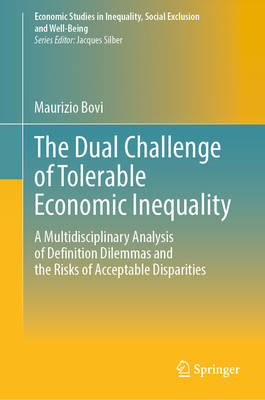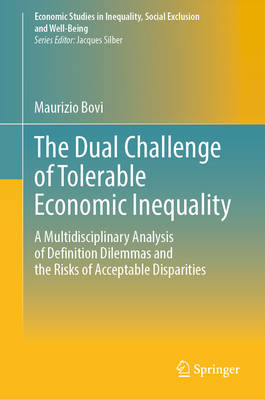
- Afhalen na 1 uur in een winkel met voorraad
- Gratis thuislevering in België vanaf € 30
- Ruim aanbod met 7 miljoen producten
- Afhalen na 1 uur in een winkel met voorraad
- Gratis thuislevering in België vanaf € 30
- Ruim aanbod met 7 miljoen producten
Zoeken
The Dual Challenge of Tolerable Economic Inequality
A Multidisciplinary Analysis of Definition Dilemmas and the Risks of Acceptable Disparities
Maurizio Bovi
€ 96,45
+ 192 punten
Omschrijving
This book tackles two central challenges in the discourse on economic inequality. First, there is no consensus on what constitutes a morally acceptable inequality, as even philosophers struggle to conceptualize benchmarks for distinguishing between acceptable and unacceptable disparities. Second, while tolerable inequality has the potential to evolve into systemic patterns of polarization, segregation, and discrimination, it can ultimately escalate into unjustifiable inequality. This self-reinforcing cycle complicates efforts to achieve equitable distributions. The book explores these challenges in two sections through a multidisciplinary lens. Part one discusses distributive justice and philosophical debates surrounding inequality's acceptable boundaries. Part two employs the concept of social aggregations--such as families, cities, firms, and nations--to examine how even initially tolerable inequality can spread and intensify through interconnected social systems. By emphasizing the relational nature of inequality, the book underscores its systemic complexity and the need for holistic understanding.
Specificaties
Betrokkenen
- Auteur(s):
- Uitgeverij:
Inhoud
- Aantal bladzijden:
- 189
- Taal:
- Engels
- Reeks:
Eigenschappen
- Productcode (EAN):
- 9783031970658
- Verschijningsdatum:
- 2/08/2025
- Uitvoering:
- Hardcover
- Formaat:
- Genaaid
- Afmetingen:
- 152 mm x 218 mm
- Gewicht:
- 430 g

Alleen bij Standaard Boekhandel
+ 192 punten op je klantenkaart van Standaard Boekhandel
Beoordelingen
We publiceren alleen reviews die voldoen aan de voorwaarden voor reviews. Bekijk onze voorwaarden voor reviews.







